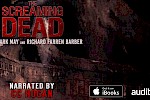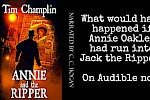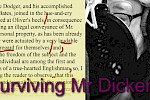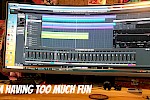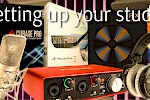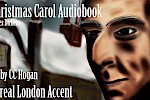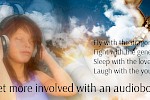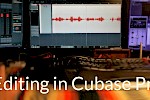Audiobook Menu
FAQs:
Reading Your Book
Recording Your Book
Editing Your Recording
Technical Questions
Recording your own poetry
Other Articles:
A General Guide
Recording Dirt
Recording My Poetry
Preparing Your Manuscript
Plan your audiobook as you write
Using iZotope RX 6 with Cubase
Editing in Cubase demonstration
A bit on Punch & Roll
Should you delete breaths?
Setting up your Studio
External Articles & Resources
Punch and Roll
Part of the series of tips on recording your book as an audiobook, this article covers questions about editing.
Should I remove all the breaths?
No. Breaths are a legitimate part of speech and can add emotion. Although you may want to remove most from the narrator, especially in short narrative sections, be careful of removing too many from dialogue. It might make it very bland.
Should I remove breaths from the front of lines?
This is probably from where you will remove most breaths, but be careful you do not destroy the emotion or shorten the gap after the previous line too much.
What do I do about loud breaths in the middle of a sentence?
There is nothing wrong with a breath in the middle of a line if it makes sense. if it is very loud, you may want to remove it, but do not remove the gap - fill with room tone.
I have removed a breath, but it now sounds cut off.
Sometimes you cannot remove a breath because it is too much part of the read. In this case, isolate it with your editor and lower the level of the breath considerably. It will be less intrusive and hopefully sound natural.
I have a breath in a strange place in a sentence, can I just cut it out?
If you are very lucky you can, but the chances are it will just sound odd. The best way of repairing this kind of problem is re-recording the line.
What is the perfect length of a pause?
There is no such thing. Pausing achieves several different things:
- Denotes a change of scene
- Allows the character to think before they speak
- Breaks up complex ideas into bite-sized pieces
Exactly how long these pauses should be, is very difficult to pin down and is one of the many things that comes with experience. If in doubt, increase the length of the pause, then wind back a couple of sentences, play back, and stop when you feel the next line should start. That will probably be a good clue.
Also, if the next line seems to jump in, then your pause is too short.
I have removed breaths, now the pauses seem too long.
We don't really differentiate between a breath and a word when we listen, especially if it is a loud breath. Sometimes, when you remove the breath from the beginning of a section, the pause will now be too long. You probably need to shorten by the length of the breath. Caution, however, this can also increase the pace too much if done for every breath!
Do you ever put in sound effects?
Generally, the addition of sound effects and music to a straight audiobook is frowned upon. Many think they make an unnecessary distraction. Personally, I quite like them, certainly ambient sfx, but there is a problem. To get them right, you need a huge library of good effects which are expensive, otherwise, you will make your beautiful recording sound amateurish. It also takes a lot of time and skill to get right. In the context of this FAQ, I would tend to avoid them.
Is editing boring to do?
It can get tedious, but it is vitally important. Don't skip small problems through laziness, any more than when you proofread your book.
Do you every re-record?
Frequently. One advantage of recording your own work is that the voice over doesn't go home. If when you are editing, you are unhappy about something, it is often easier and better to re-record a line than to fiddle around trying to correct the problem.
How do I edit out mouth clicks?
This is fiddly. Mouth clicks are very short, however, if you just chop them out and join up the following audio, it might make the word jump. You can sometimes get away with cutting them out leaving a hole, but the better way is to put a cut just before the click, then add a very short fade-in to cover the click.
Don't spend hours at this - if you cannot get a satisfactory result, re-record.
I have a breath hard on the end of a word. How can I remove it?
Sorry, but there is a very good chance you can't. If the breath is actually joined onto the last sound of the word, then you will either end up with a nasty cut off, or lose part of the word. Also, the way you read that last sound would have been affected by the breath, so will sound odd without it.
You can sometimes get away with a quick fade, but if you can't live with the breath, the chances are you are re-recording.
Will I have to edit every gap in my recording?
Exactly how much you edit is up to you. However, if you commit to heavy editing, it can make the initial recording easier. If you know you will be spending time editing, then you can leave unnaturally long gaps between sentences to help with your breathing, and occasionally smack your lips!
I edit very heavily because I suffer from a dry mouth and I like to remove mouth noise. I also listen carefully to ALL breaths and decide whether to remove them (replacing with room tone), lower their level, clean them up or leave them. I believe all recordings should be treated like this.
Should I use crossfades?
If everything goes to plan, clean, butt editing is fine, but I have never yet met a long recording that was quite so accommodating. Having said that, I started years ago working on 1/4 inch tape, and butt editing with a razor blade and editing tape was all we had!
I use crossfades frequently when editing, especially when editing in room tone. Although it is probably not necessary most of the time, I have made it a habit to edit in the room tone, line it up, and press X (in Cubase Pro) to create a very short 30ms crossfade. It makes the edit seamless, which is what we are after.
Should I always use room tone?
Room tone or Buzz Track is a short recording of the "room" that is used to fill in holes in the recording so that you do not hear a sudden loss of ambience.
The strict answer is that you should always fill gaps with room tone when editing recordings where problems are not covered by background sound effects and so on. However, in practice, this does depend on the recording environment.
In pro studios specifically designed for voice over recording, the room is so quiet that it is unnecessary, especially if a gate was used in recording. However, in a home studio, you may not be able to get your room that quiet. Remember that many people will listen to audiobooks on headphones so will be more aware of changes in ambience, even when quite subtle.
How do I get the right EQ for my mix?
This is difficult, especially when dealing with your own voice!
Bass and treble is a very subjective thing, but you need to be aware of a few things. To start with, if you invest in very good quality speakers, which is worthwhile for editing, they are not necessarily very representative of how people will listen to your book. Many people will be listening on ear buds or headphones.
It is impossible to cater for everyone, so you need to find an average. Make sure you check your EQ against a couple of environments and speaker/headphone types.
If you are a male or a female with a lower voice, you will probably want to roll off some mid frequencies, say around 1.5-2.0 khz, and a widish region, by 5 or 6db. You will also need to roll off everything below around 50-100hz and above 15khz, which is above the range most people can hear, especially when older.
Other than that, I suggest you listen to some of the better-produced books out there and compare them with your own sound.
Remember, messing around with bass and treble will not magically change your voice making it deep and sexy - it can only enhance what you already have!
How to I get rid of mouth slaps and clicks?
These are fiddly! You can remove some with very careful editing, working zoomed right in, or you can use plugins like iZotope RX6 - about $400 for the standard version and very powerful.
However, making sure you are properly hydrated, avoiding dairy, and getting the mic position right can reduce most at record and hopefully leave you little to correct.
I have edited out breaths, but the passage sounds less exciting
If you are narrating an action sequence, it is not just the tone of your voice that will convey excitement, but the way you take breaths too.
If you have a breath that is too much, rather than remove it, separate it and lower it in level. This will make it less obtrusive but still keep the passion in the read.
Also, if you do remove breaths, you might want to tighten up the gap a little, perhaps so the next voice line starts where the beginning of the breath had been. Otherwise, you might slow the pace too much.
Will punching in eliminate editing?
No.
Punching in, winding back and going into record at the point of a mistake, will speed up editing since you will not have to wade through multiple takes.
However, punching in is not always clean, especially when you are both the voice over and the engineer, though programming in the punch in point can make things neater. Also, it is common after a punch in to start speaking just a tiny bit late, leaving a longer pause than is necessary. Consequently, you will need to check every punch in point during the edit and there is a good chance you will edit them all a little bit.
Should I use automatic breath reduction?
Some systems like iZotope RX 6 offer breath control that can detect breaths and reduce them or delete them.
This can speed up editing, but for dialogue, there are a couple of problems.
Firstly, breaths can convey emotion, so you may not want a breath removed or suppressed, depending on the context.
Secondly, often when you remove a breath, you then need to shorten the gap left a little bit. These plugins do not do that.
Good editing of breaths can make or break a performance - my temptation is to advise you to handle them manually.
How zoomed in to my waveform should I be when editing
For normal editing, removing breaths, general cleaning up and so on, find a zoom level that gives you enough accuracy when marking out edits, but is not so zoomed in that you find it hard to keep up.
Once you find a comfortable zoom, try to stick to it. You will get used to the timing of the sound against the movement of the waveform and that will help the timing of your edits.











